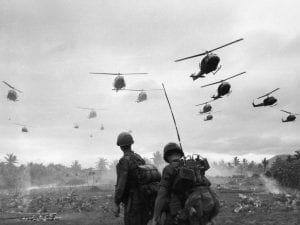Volume V – Number 1
Richard A. Falk
Abstract: There is a long list of arguments that the American government and media use to justify the position of American militarism and intervention in Vietnam. They range from the necessity for containment of China to upholding the integrity of SEATO, and even to upholding the credibility of American commitments. Similarly there are three very contrasting interpretations on the status American involvement in the Vietnam War. These three interpretations are that the Vietnam War has been a success, an immeasurable failure, or a qualified failure. The latter of these arguments includes the Nixon Doctrine of 1969, which outlines three guidelines for future American involvement in Asia so that the mistakes that were made in American policy with regard to Vietnam would be prevented in the future. However, this article proposes a fourth interpretation of the Vietnam War. This interpretation does not comment on the relative success or failure of the United States in the Vietnam War, because it argues instead that American involvement in Vietnam is wholly unjustified. This fourth position opposes American militarism in Vietnam on political and moral grounds, and argues that a position of non-intervention would follow better with historic trends in Asia as well as American traditional values of self-determination.
Keywords: Vietnam War, militarism, intervention, Nixon Doctrine, containment, Asia, foreign policy




You must be logged in to post a comment.